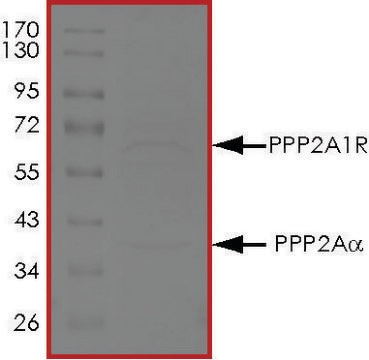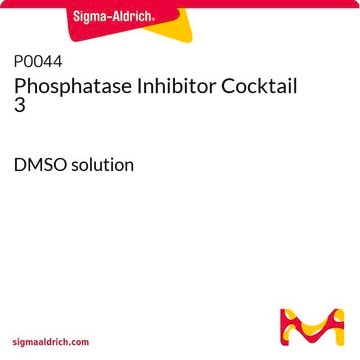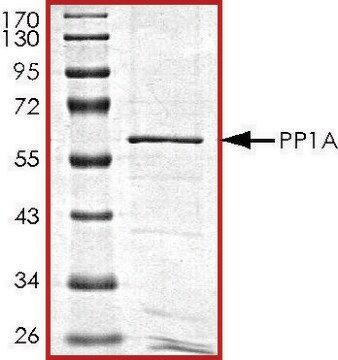14-595-M
PP1α Protein, 10 µg
Recombinant, full length, human PP1α, for use in Phosphatase Assays.
Szinonimák:
PPP1C, Phosphoprotein phosphatase 1, Phosphorylase phosphatase
Bejelentkezésa Szervezeti és Szerződéses árazás megtekintéséhez
Összes fotó(1)
About This Item
UNSPSC kód:
12352200
eCl@ss:
32160405
NACRES:
NA.32
Javasolt termékek
biológiai forrás
human
Minőségi szint
rekombináns
expressed in E. coli
Forma
solution
eltarthatósági idő
6 mo.
molekulatömeg
Mw 37.6 kDa
gyártó/kereskedő neve
Upstate®
technika/technikák
activity assay: suitable (phosphatase)
oldhatóság
water: soluble
NCBI elérési szám
UniProt elérési szám
tárolási hőmérséklet
−20°C
Géninformáció
human ... PPP1CA(5499)
Általános leírás
Research area: Neuroscience
Protein Phosphatase 1 (PP1) is one of the key serine/threonine-specific protein phosphatases.
Protein Phosphatase 1 (PP1) is one of the key serine/threonine-specific protein phosphatases.
Alkalmazás
Research Category
Inflammation & Immunology
Inflammation & Immunology
Biokémiai/fiziológiai hatások
Protein Target: PP1α Target Sub-Family: Ser/Thr phosphatase
Protein Phosphatase 1 (PP1) has been associated with a wide range of biological processes, including synaptic plasticity, cell cycle progression, dopaminergic neurotransmission, contraction, and glycogen metabolism, maintaining microtubule stability and the dephosphorylation of tau. Furthermore, PP-1 plays a vital role in synaptic development, plasticity, signaling, neurite outgrowth, synapse formation, ion channel function, and neurotransmission. Changes in PP-1 signaling within dendritic spines have been linked to various neurological and psychiatric disorders.
Protein Phosphatase 1 (PP1) has been associated with a wide range of biological processes, including synaptic plasticity, cell cycle progression, dopaminergic neurotransmission, contraction, and glycogen metabolism, maintaining microtubule stability and the dephosphorylation of tau. Furthermore, PP-1 plays a vital role in synaptic development, plasticity, signaling, neurite outgrowth, synapse formation, ion channel function, and neurotransmission. Changes in PP-1 signaling within dendritic spines have been linked to various neurological and psychiatric disorders.
Kiszerelés
Also available in 250 µg size --call for pricing and availability and reference catalog number 14-595M when ordering the 250 µg size.
Minőség
routinely evaluated by dephosphorylation of 100μM DiFMUP
Fizikai forma
Heparin agarose followed by Q agarose
Tárolás és stabilitás
6 months at -20°C from date of shipment
Egyéb megjegyzések
For Specific Activity data, refer to the Certificate of Analysis for individual lots of this enzyme
Jogi információk
UPSTATE is a registered trademark of Merck KGaA, Darmstadt, Germany
Jogi nyilatkozat
Unless otherwise stated in our catalog or other company documentation accompanying the product(s), our products are intended for research use only and are not to be used for any other purpose, which includes but is not limited to, unauthorized commercial uses, in vitro diagnostic uses, ex vivo or in vivo therapeutic uses or any type of consumption or application to humans or animals.
Figyelmeztetés
Warning
Figyelmeztető mondatok
Óvintézkedésre vonatkozó mondatok
Veszélyességi osztályok
Skin Sens. 1
Tárolási osztály kódja
12 - Non Combustible Liquids
WGK
WGK 1
Analitikai tanúsítványok (COA)
Analitikai tanúsítványok (COA) keresése a termék sarzs-/tételszámának megadásával. A sarzs- és tételszámok a termék címkéjén találhatók, a „Lot” vagy „Batch” szavak után.
Már rendelkezik ezzel a termékkel?
Az Ön által nemrégiben megvásárolt termékekre vonatkozó dokumentumokat a Dokumentumtárban találja.
The role of protein phosphatase-1 in the modulation of synaptic and structural plasticity.
Munton, Richard P, et al.
Febs Letters, 567, 121-128 (2004)
Alphonse Garcia et al.
Biochimie, 85(8), 721-726 (2003-10-31)
The reversible phosphorylation of proteins controlled by protein kinases and protein phosphatases is a major mechanism that regulates a wide variety of cellular processes. In contrast to C. elegans, recent studies in mammalian cells have highlighted a major role of
Modulation of dendritic spines by protein phosphatase-1
Advances in Pharmacology, 90.0, 117-144 (2021)
Karl Foley et al.
The Journal of neuroscience : the official journal of the Society for Neuroscience, 41(14), 3040-3050 (2021-04-09)
Protein phosphatases, by counteracting protein kinases, regulate the reversible phosphorylation of many substrates involved in synaptic plasticity, a cellular model for learning and memory. A prominent phosphatase regulating synaptic plasticity and neurologic disorders is the serine/threonine protein phosphatase 1 (PP1).
Targeting phosphatases as the next generation of disease modifying therapeutics for Parkinson?s disease
Braithwaite SP, et al.
Neurochemistry International, 61, 899-906 (2012)
Tudóscsoportunk valamennyi kutatási területen rendelkezik tapasztalattal, beleértve az élettudományt, az anyagtudományt, a kémiai szintézist, a kromatográfiát, az analitikát és még sok más területet.
Lépjen kapcsolatba a szaktanácsadással









